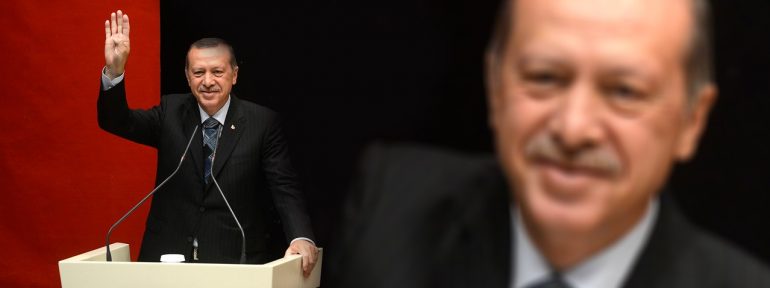Interpreting the implications of Recep Tayyip Erdogan’s victory for the Kurds is a complex endeavor, as Kurdish political interests are diverse and span multiple national borders. However, the resurgence of Erdogan, Turkey’s authoritarian Islamist leader, is bound to influence Kurdish politics within Turkey and extend into Iraq and Syria.
For over two decades, Erdogan has been molding Turkey’s political landscape. As a NATO member and a significant regional player, Turkey’s influence permeates well beyond the Middle East and Europe.
Following a close victory in a historic election runoff, an elated Erdogan addressed his supporters at the presidential palace in Ankara, claiming, “No one has lost today. All 85 million people have won.” This statement, however, obscures the reality that nearly half of the electorate (over 48%) voted against his autocratic rule, signaling a deep national divide. Major cities like Istanbul and Izmir, along with predominantly Kurdish towns, backed his opponent, Kemal Kilicdaroglu.
Frederike Geerdink, a freelance journalist and publisher of the weekly newsletter Expert Kurdistan, remarked during a phone interview, “Erdogan’s win is essentially bad news for Kurds everywhere.”
Erdogan began his reign in 2000 with a seemingly friendly policy towards the Kurds, known as the “Kurdish opening”. But after a backlash and loss of nationalist votes, he quickly reverted to his confrontational stance against the Kurdish opposition. From the early 2010s, Erdogan has gradually intensified his crackdown on the Kurds, curbing media and religious freedoms in an increasingly authoritarian manner.
During his victory speech, responding to calls for a continued crackdown on Kurdish politicians accused of collaborating with the rebel group, the Kurdistan Workers’ Party (PKK), Erdogan vowed to keep Selahattin Demirtas, the former co-leader of the pro-Kurdish HDP—Turkey’s second-largest opposition party—in prison for the duration of his rule.
Even though the European Court of Human Rights ordered his release, Demirtas has remained imprisoned since 2016. During Erdogan’s victory speech, thousands of his supporters called for the “death penalty” when Demirtas’ name was mentioned.
This suppression extends beyond Turkey’s borders into Iraq and Syria, where Turkish military operations regularly target PKK and pro-PKK fighters. “This crackdown doesn’t only impact the Kurdish opposition and population within Turkey, but also the Kurdish cause in Iraq,” Geerdink added.
The Kurdistan Regional Government (KRG), led by the Kurdistan Democratic Party (KDP), has seen its dependence on Ankara grow both economically and politically over the past several years. As a result, the Kurdistan Region frequently finds itself vulnerable to Erdogan’s increasingly authoritarian influence.
Erdogan’s leverage has led to the prolonged suspension of oil exports from the Kurdistan Region following a verdict by the ICC International Court of Arbitration in Paris favouring Baghdad over Ankara. Since March 25, Turkey has blocked oil exports, leaving the KRG with virtually no revenue.
Ankara has also heightened pressure on the Patriotic Union of Kurdistan (PUK), due to its ties with forces in northeastern Syria linked to the PKK. This escalation reached a climax in April when Ankara imposed a flight ban on departures from Sulaymaniyah International Airport, a PUK-controlled area, citing alleged PKK activities.
Further tensions arose when Ankara was implicated in a drone attack near the same airport. The drone reportedly targeted a convoy carrying Mazloum Abdi, the commander of the SDF, along with several US military officials. Although there were no casualties, the incident served as a stark warning to the PUK regarding its growing ties with the SDF—developments that have troubled Ankara.
Despite these security concerns, Erbil has eagerly welcomed Erdogan’s re-election. Dr. Yerevan Saeed, research associate at the at the Arab Gulf Institute in Washington, suggested that Erdogan’s continuity in office could be “beneficial to a certain extent” for the Kurdistan Region, as it ensures the maintenance of established ties with Ankara.
Dr. Saeed further suggested that Erdogan’s victory could positively impact the resumption of oil exports from the Kurdistan Region, given the relationship fostered with Ankara since the early 2000s. However, he warned, “an over-reliance on Turkey could potentially harm the Kurdistan Region.”
Historically, this dependence has led Erbil to sever ties with Baghdad, relying heavily on Ankara. Yet, besides pursuing its own economic and political interests, Turkey also seeks to thwart Erbil’s aspirations for financial and political autonomy.
As Erdogan wins another five years in power, Erbil hopes to benefit from strong ties with Ankara, much of which has relied on Nechirvan Barzani’s personal relations with Erdogan in the past. The pressing question now is whether Masrour Barzani can maintain this beneficial relationship, as Baghdad seeks control over the Region’s oil and gas resources, amid internal Kurdish conflicts and increasing pressure on Erbil’s weakened position against Baghdad.


